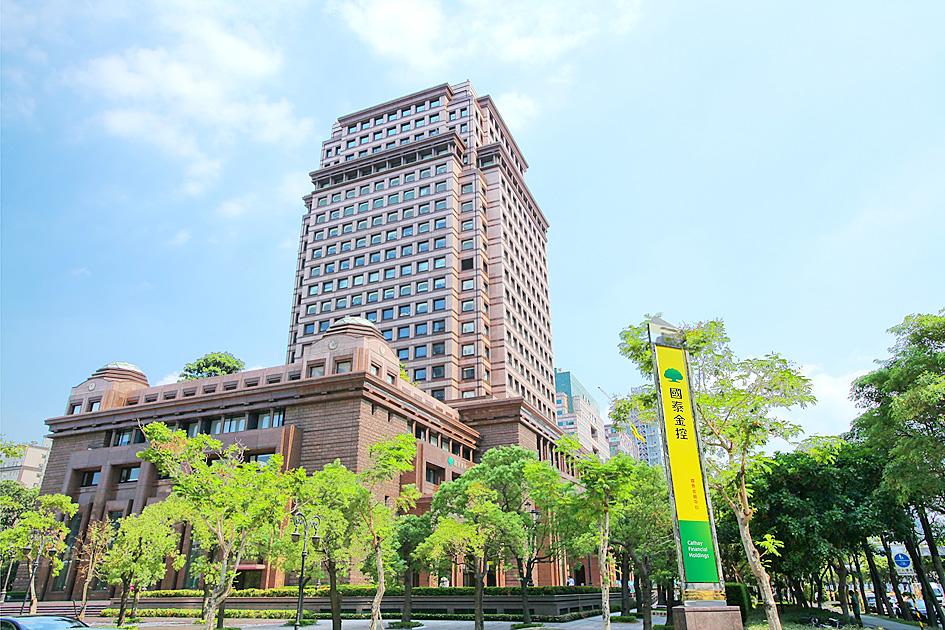Cathay Financial Holding Co’s (國泰金控) life insurance arm yesterday gave an upbeat outlook for its recurring yield and hedging costs for this year, while its banking arm aims to achieve high single-digit percentage growth in loans, the company told an investors’ conference yesterday.
The insurer arm, Cathay Life Insurance Co (國泰人壽), reported a recurring yield of 2.79 percent for last quarter, down from 3.11 percent a year earlier, while the ratio of its hedging costs fell from 1.69 percent a year earlier to 1.4 percent last quarter, it said.
Recurring yield is a financial gauge that shows how much the insurance company earns from its investment on a regular basis.

Photo courtesy of Cathay Financial Holding Co
Recurring yield weakened in the first quarter as a result of the insurer’s cautious investment strategy and lower market interest rates last year, Cathay Life executive vice president Lin Chao-ting (林昭廷) told the conference.
However, as the insurer has adjusted its strategy and the market rates have rebounded, it expects the recurring yield to improve to register above 3 percent on average for this year, Lin said.
“We just began building new positions recently, so the recurring yield would not rise immediately, but it would recover in following quarters,” he said.
The insurer has forecast that its full-year hedging costs would range from 1 to 1.5 percent, he added.
Asked why Cathay Life did not transfer last year’s profits to its parent company for dividend distribution, Lin said that the insurer directed the profits to capital, as it hopes to keep its risk-based capital at a higher level to weather market volatility and to adapt to stricter solvency rules.
Meanwhile, Cathay United Bank (國泰世華銀行) reported an annual growth of 13 percent in its loans to NT$1.71 trillion (US$61 billion) as of the end of March, while mortgages grew 19 percent year-on-year to NT$826 billion, it said.
The central bank’s selective credit controls had a limited effect on the bank’s mortgage business, as most of its clients only have one home, Cathay United spokesman Daniel Teng (鄧崇儀) said.

Taiwan Semiconductor Manufacturing Co (TSMC, 台積電), the world’s biggest contract chipmaker, booked its first-ever profit from its Arizona subsidiary in the first half of this year, four years after operations began, a company financial statement showed. Wholly owned by TSMC, the Arizona unit contributed NT$4.52 billion (US$150.1 million) in net profit, compared with a loss of NT$4.34 billion a year earlier, the statement showed. The company attributed the turnaround to strong market demand and high factory utilization. The Arizona unit counts Apple Inc, Nvidia Corp and Advanced Micro Devices Inc among its major customers. The firm’s first fab in Arizona began high-volume production

VOTE OF CONFIDENCE: The Japanese company is adding Intel to an investment portfolio that includes artificial intelligence linchpins Nvidia Corp and TSMC Softbank Group Corp agreed to buy US$2 billion of Intel Corp stock, a surprise deal to shore up a struggling US name while boosting its own chip ambitions. The Japanese company, which is adding Intel to an investment portfolio that includes artificial intelligence (AI) linchpins Nvidia Corp and Taiwan Semiconductor Manufacturing Co (TSMC, 台積電), is to pay US$23 a share — a small discount to Intel’s last close. Shares of the US chipmaker, which would issue new stock to Softbank, surged more than 5 percent in after-hours trading. Softbank’s stock fell as much as 5.4 percent on Tuesday in Tokyo, its

COLLABORATION: Softbank would supply manufacturing gear to the factory, and a joint venture would make AI data center equipment, Young Liu said Hon Hai Precision Industry Co (鴻海精密) would operate a US factory owned by Softbank Group Corp, setting up what is in the running to be the first manufacturing site in the Japanese company’s US$500 billion Stargate venture with OpenAI and Oracle Corp. Softbank is acquiring Hon Hai’s electric-vehicle plant in Ohio, but the Taiwanese company would continue to run the complex after turning it into an artificial intelligence (AI) server production plant, Hon Hai chairman Young Liu (劉揚偉) said yesterday. Softbank would supply manufacturing gear to the factory, and a joint venture between the two companies would make AI data

DOLLAR SIGNS: The central bank rejected claims that the NT dollar had appreciated 10 percentage points more than the yen or the won against the greenback The New Taiwan dollar yesterday fell for a sixth day to its weakest level in three months, driven by equity-related outflows and reactions to an economics official’s exchange rate remarks. The NT dollar slid NT$0.197, or 0.65 percent, to close at NT$30.505 per US dollar, central bank data showed. The local currency has depreciated 1.97 percent so far this month, ranking as the weakest performer among Asian currencies. Dealers attributed the retreat to foreign investors wiring capital gains and dividends abroad after taking profit in local shares. They also pointed to reports that Washington might consider taking equity stakes in chipmakers, including Taiwan Semiconductor